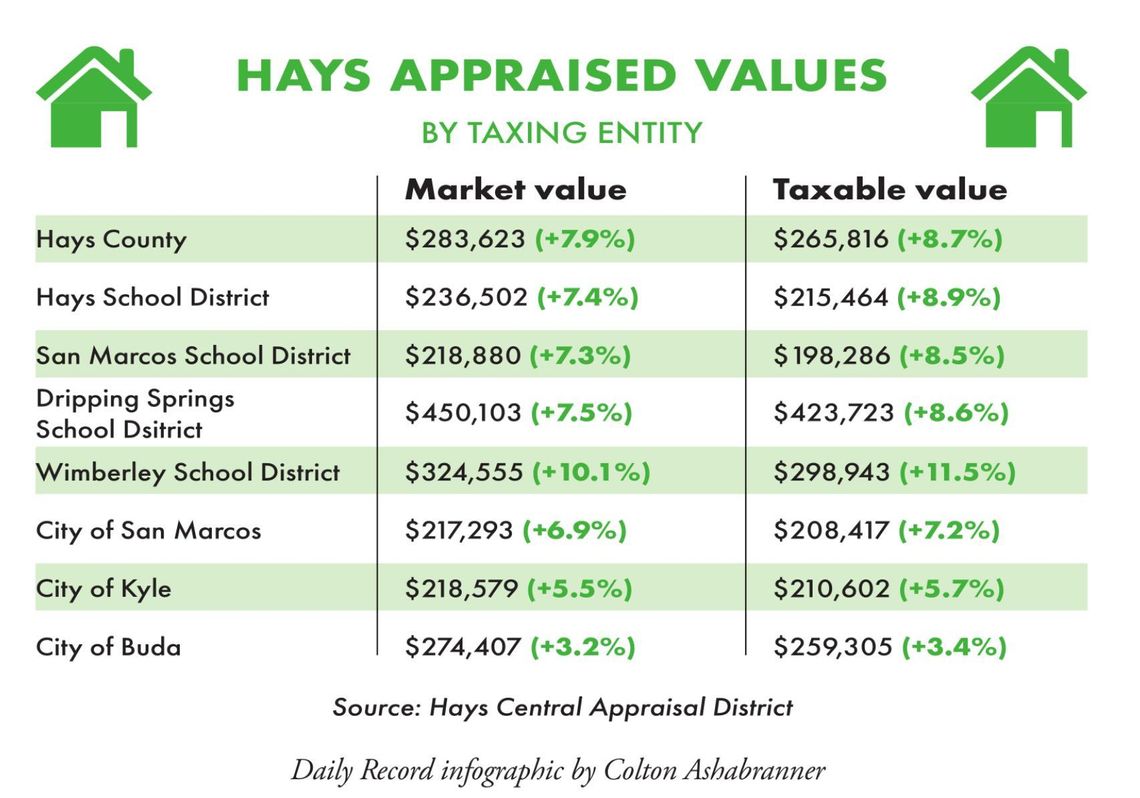The San Marcos property tax rate will likely hold steady for 2020 at .6139, the San Marcos City council says, but homeowners’ taxes may increase in tandem with rising home values in Central Texas.
The city council meeting on June 2 featured a topic that sparked heated discussion in the community when councilmembers directed the Assistant Director of Finance Melissa Neel to calculate two rates as mandated by the 2019 Texas Senate Bill 2 (SB2). These were the No-New-Revenue Tax Rate, or the rate at which city revenues from property taxes remain the same as the previous year, and the Voter-Approval Tax Rate, which would be the rate at which city revenues increase 3.5% or higher normally, but has defaulted to the old rate of 8% due to the COVID-19 state of emergency.
SB2 limited property tax increases across Texas by capping revenue increases at 3.5%. The proposed budget will maintain the current tax rate of 61.39 cents on each $100 of taxable value of real property that is not exempt from taxation.
The meeting on June 2 followed a budget work session on May 26 where councilmembers discussed options for the tax rate: they could reduce taxes to a rate at which revenues only increase by 3.5%, keep the rate the same or raise it to a rate at which revenues increase by 8%.
They resolved to keep the rate the same, as they have for many years, rather than increase it saying they could not increase the tax rate when residents are suffering the economic fallout of the pandemic. Council agreed to hold the rate despite the fact that they are impacted substantially by the same crisis and are working hard to make up $6.4 million in projected revenue shortfalls.
SB2 requires the city to calculate both the No-New-Revenue Tax Rate and the Voter-Approval Tax Rate to ensure the proposed rate is within the allowable limits. Any increase in revenues higher than the 8% would need voter approval.
Last week’s council direction to Neel was a formality to comply with the state legislation.
While the city is not raising taxes, with inevitable property value increases, homeowners will likely see a slight increase in what they pay.
Lowering the tax rate to allow for only a 3.5% increase in revenue compared to keeping it the same rate would make a huge impact to the city’s budget, but minimal impact to homeowners, Neil said in the meeting. It would result in a further reduction of $1.5 million in revenue for the city’s general fund, where the average homeowner’s bill would be reduced by around $100.
Preliminary valuation as of January 2020 for all San Marcos property is $6,070,118,837. Hays County’s overall preliminary market value rose to a little more than $34.45 billion this year, up more than 17% from $29.37 billion in 2019.
According to the Hays County Appraisal District (CAD), appraised market values of properties in the City of San Marcos rose 6.9% over the last year, 7.3% in the San Marcos Consolidated Independent School District and 7.9% in Hays County.
The city calculated annual tax bills with the same rate of 0.6139 resulting in $613.90 for a home valued at $100,000, $1,227.20 for a home valued at $200,000 and $1,841.70 for a home valued at $300,000.
The average market value of homes in Hays County rose to $217,293 over the last year. The average taxable value, the market value minus any exemptions, increased as well, up 7.2% to $208,417.
Hays County added 2,786 new homes and 127 new commercial buildings to the appraisal roll for 2020, according to CAD. Total new improvements added more than $1.04 billion to the taxable value for 2020.
Commercial and industrial property value increased by more than 33%, to $3.73 billion compared with $2.8 billion last year.
CAD said that the impact of the economic crisis caused by the pandemic will not be reflected in appraisals until 2021.







